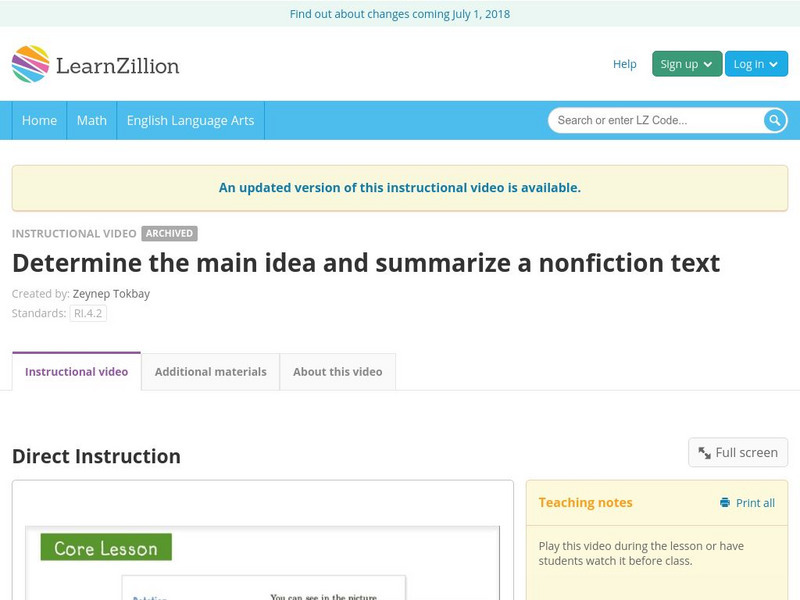Hi, what do you want to do?
Lesson Planet
EdTech Tuesday: NewsBug
Here is a great sneak peek into the NewsBug app, which curates news stories and images appropriate for classroom use and is free from social media connections and in-app purchases.
British Council
William Shakespeare
After watching a three-minute video detailing the life of William Shakespeare, scholars take part in several activities designed to show what they know about the famous writer. Learners read a series of eight sentences and put them in...
SciShow Kids
Know Your Globe
What are the green and blue things on a globe? Water and land—the two main features on Earth. Watch a video that distinguishes items on the globe from continents to countries and water to oceans and freshwater. Quiz the...
SciShow Kids
The Grand Canyon!
The Grand Canyon—how did it get there? Watch a video that shows how the Grand Canyon formed from water erosion over a long period of time.
SciShow Kids
Could I Dig a Hole Through the Earth?
Why can't we dig through to the other side of the Earth? There are many layers and lots of heat, so the job is impossible. Watch a video that describes and explains each layer of the Earth.
HISTORY Channel
Rosie the Riveter
During World War II, many women entered the workforce as their husbands went off to war. A lot of those women worked on fighter jets and bombers. They were known as Rosie the Riveters. Learn more about the well-known icon with an...
HISTORY Channel
Women in the Cockpit
Alberta Kinney was a member of the Women's Airforce Service Pilot (WASP) program. They were some of the first women in America to fly army aircraft in World War II. Viewers discover who Kinney was and how the program...
Townsend Press
Active Reading and Study
The difference between an active reader and a passive reader has to do with the ways they access the same material. Review study skills and note-taking techniques with a video about active reading, which includes tips for using...
Townsend Press
Critical Reading
Skilled readers know that any author's argument must be carefully analyzed and evaluated. Assist youngsters in their reading pursuits with a video about logical fallacies, including circular reasoning, straw man arguments, and false...
Townsend Press
Relationships I
Transition words can be a very important addition to any writer's toolbox. Learn more about addition words and time words, and how they can enhance the organization of any writing passage, with an informative video about reading...
Townsend Press
Relationships II
Cause and effect, problem and solution, compare and contrast, illustration and example -- your class has undoubtedly seen these essay structures before. But how are they related? Watch a reading video about the ways relationships between...
Townsend Press
Argument
Form well-crafted arguments with the help of an educational video. Fourth graders study various examples of persuasive arguments, including thesis statements and cartoons, and observe the ways that supporting details can enhance the...
Townsend Press
Purpose and Tone
A powerful image or well-placed comment always has intention behind it. Guide young readers through author's purpose and tone with a language arts video that explains why word choice is key in writing clearly and coherently.
Townsend Press
Inferences
A picture is worth a thousand words. Help your class out with some of those words with a video about drawing inferences from reading passages, images, and other media. The resource focuses on the supporting details of each passage...
Townsend Press
Implied Main Ideas
Skilled readers can find the main idea of an informative passage without finding it directly stated. A reading video prompts elementary learners to examine supporting details in several examples, and to infer what the main idea...
Townsend Press
Supporting Details
Helpful for both reading and writing units, a video about identifying supporting details in reading passage shows young learners the importance of bulking up informative writing. The presentation uses cartoons and longer passages to...
Townsend Press
Main Ideas
Once you find the main idea of a paragraph, it's easy to see how the rest of the details are supporting evidence. Take your readers through an explanatory video that demonstrates the points and supports of several reading examples.
Imagine Learning Classroom
Learn Zillion: Identify the Main Idea of Text by Synthesizing Key Details
In this lesson, students will learn how to identify the main idea of a section of text by synthesizing key details from the text. [9:02]
Imagine Learning Classroom
Learn Zillion: Find the Main Idea of a Section of Nonfiction Text
In this lesson, you will learn how to find the main idea of a section of nonfiction text by gathering details from that section and asking "What are these details mostly teaching me about?" [3:31]
Imagine Learning Classroom
Learn Zillion: Determine the Main Idea of a Paragraph
In this lesson, you will learn how to determine the main idea of a paragraph by looking at the first sentence and asking 'what is this paragraph teaching me?' [4:27]
Imagine Learning Classroom
Learn Zillion: Determine the Main Idea and Summarize a Nonfiction Text
In this lesson, you will learn how to determine the main idea and summarize what you have read by connecting ideas presented throughout the text. [7:16]
Imagine Learning Classroom
Learn Zillion: Determine the Main Idea and Summarize a Nonfiction Text
In this lesson, you will learn how to determine the main idea by using key details to summarize nonfiction text. [7:16]
Imagine Learning Classroom
Learn Zillion: Determine the Theme of a Story
In this lesson, you will learn how to identify the theme in a passage by asking "What did the main character learn?" [4:16]
Imagine Learning Classroom
Learn Zillion: Determine the Main Idea of an Article
In this lesson, you will learn how to determine the main idea by gathering and using evidence from the text to support the main idea. [8:10]




























